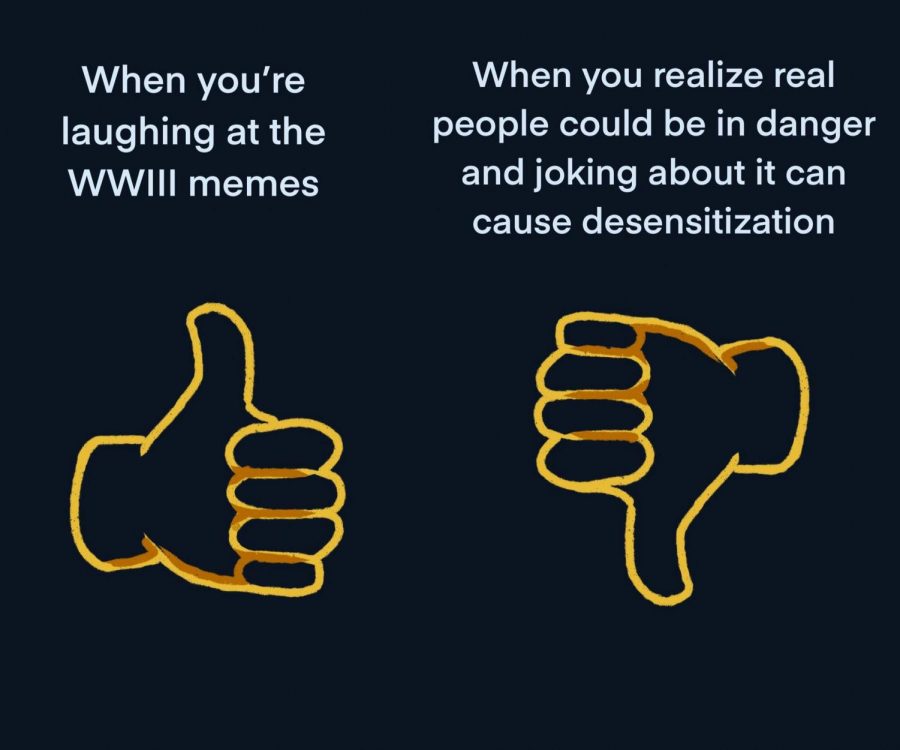Opinion | WW3 memes show a dangerous lack of understanding
January 12, 2020
I was 1 and a half on 9/11 and almost 3 when the United States invaded Iraq. My generation has never known a time when we were not at war — or at least in conflict — in the Middle East.
When President Donald Trump ordered a hit on Iranian Major Gen. Qasem Soleimani on Jan. 3, it was perhaps not as shocking to my generation as our elders. What was shocking to me, however, was that this escalatory action with one of our nation’s long-term adversaries was made the butt of so many jokes.
As news of the attack broke, while politicians and citizens alike voiced concerns over the president’s recklessness or support for the elimination of a perceived security threat, many members of my generation instead filled social media with memes and puns about the threat of war. #WW3, referencing the possibility of prolonged and deadly international conflict as a result of this escalation, began trending on Twitter.
While these memes are seemingly harmless, they display a lack of sensitivity, compassion and understanding for the complexities of a grave situation. It’s a constant debate within the comedy world — when is a joke going too far? Making memes out of political chaos is not the same as turning lemons into lemonade. It’s deterring us from holding our leaders accountable, showing empathy for the innocent people caught in the political crossfire and taking action ourselves. A chuckle is not worth it.
It’s not that memes about the draft or a questionable start to the decade are malicious, but they certainly raise the question of why war is so funny to so many. There are two sides to this coin — desensitization and deflection.
According to the Merriam-Webster dictionary, to desensitize is to “make emotionally insensitive or callous.” It’s a practice used to treat anxiety and panic disorders, yet has more broadly been used to describe a lessened reaction to typically traumatic stressors. Sara Prot and Douglas A. Gentile, psychologists at Iowa State University, discuss how this practice has a variety of applications, not all of which are intentional or positive.
“Desentization to violence can be viewed as adaptive in certain contexts (e.g., soldiers preparing for battle, medical school students becoming used to the sight of blood and gore),” they wrote. “Desentization to violence can also trigger a range of negative consequences, however, including decreased empathy for violence victims, increased aggressive thoughts and disinhibition of aggressive behaviors.”
This trend is becoming clear. A study in the journal of abnormal child psychology explored this relationship.
“Many U.S. adolescents are exposed to violence in their communities, schools and homes, with low-income and African American youth being at the greatest risk,” they found. “There is evidence that exposure to community or cross-context violence in early adolescence is associated with emotional desensitization, indicated by a pattern of lower emotional distress at high levels of exposure resulting from a quadratic relationship between violence exposure and distress.”
It makes sense that a generation of individuals who grew up seeing clips and hearing stories about violence and war would slip into this pattern. War doesn’t seem so scary when it doesn’t seem out of the ordinary.
Even within this culture of desensitization, there are still certain events that trigger an emotional response. Rather than dealing with them head on, humor helps us avoid the difficult conversations that issues like the Iranian crisis force us to consider. And this trend of deflection is nothing new. The term “gallows humor,” coined by the Germans in 1848, refers to cynical comedy drawing from taxing or distressing situations. Nichole Force, psychologist and sketch comic, explains that this practice can, in some instances, be helpful in overcoming adversity.
“Placing a comical spin on dire circumstances that are outside one’s control was an effective coping mechanism long before the Germans named the phenomenon, and continues to serve the oppressed, victimized and suffering today,” he said.
We, however, are not in the gallows. While they may be upsetting, these situations are not completely out of our control. The fundamental pillar of our democracy is that we can make our voices heard, and currently, our leaders are hearing us respond with levity and satire. We are not holding them accountable and demanding action.
It’s not that there is no way to compromise satire and activism. Political cartoons, for example, are one of the oldest means of articulating critiques instigating important discussions. But most of these Twitter memes and TikToks are not designed to encourage conversation. They’re about dancing on tanks and hiding from the draft. They’re making the lives of soldiers at war seem enjoyable or humorous. They’re sparking debate on what the first meme of the decade really is, rather than how our leaders should respond.
Whether you’re a proponent of the attacks or fear the consequences outweigh the benefits, this situation cannot be taken lightly. Engaging in serious and important discussions regarding our security, intentions and overall foreign policy is most definitely not as enjoyable as making TikToks about going to war. But it’s not meant to be.



